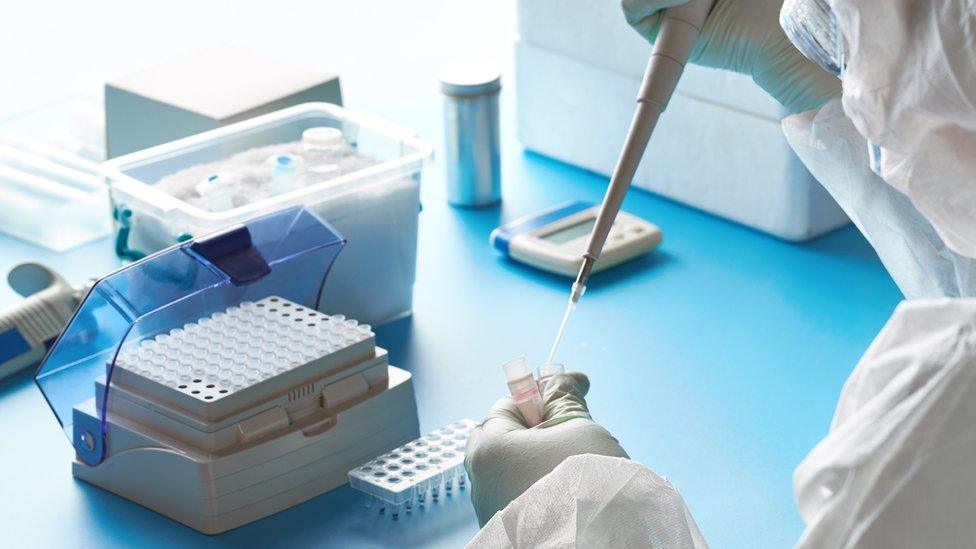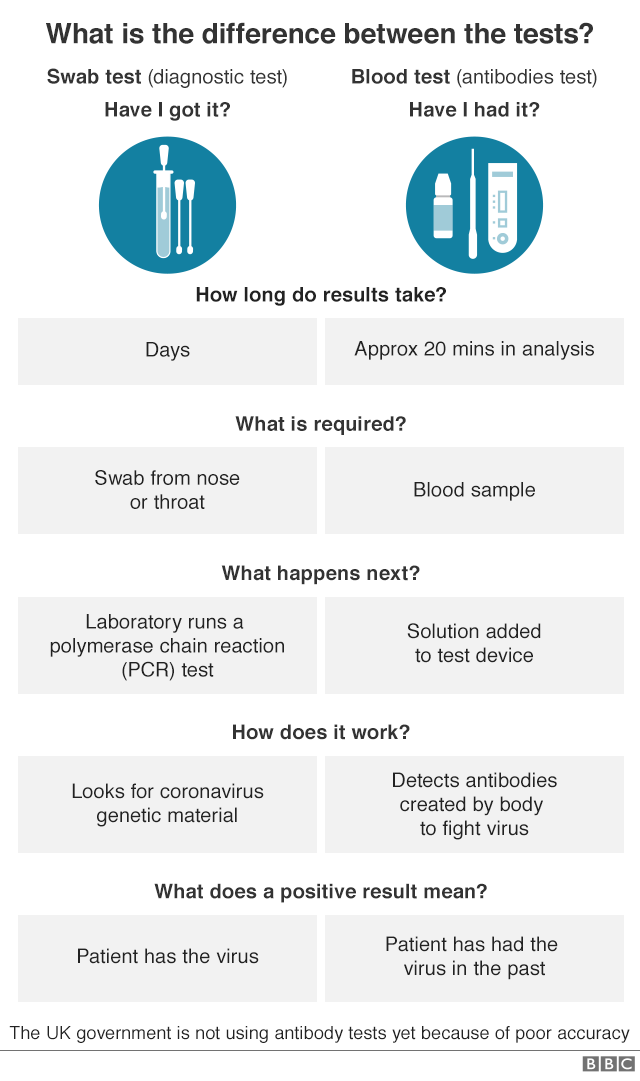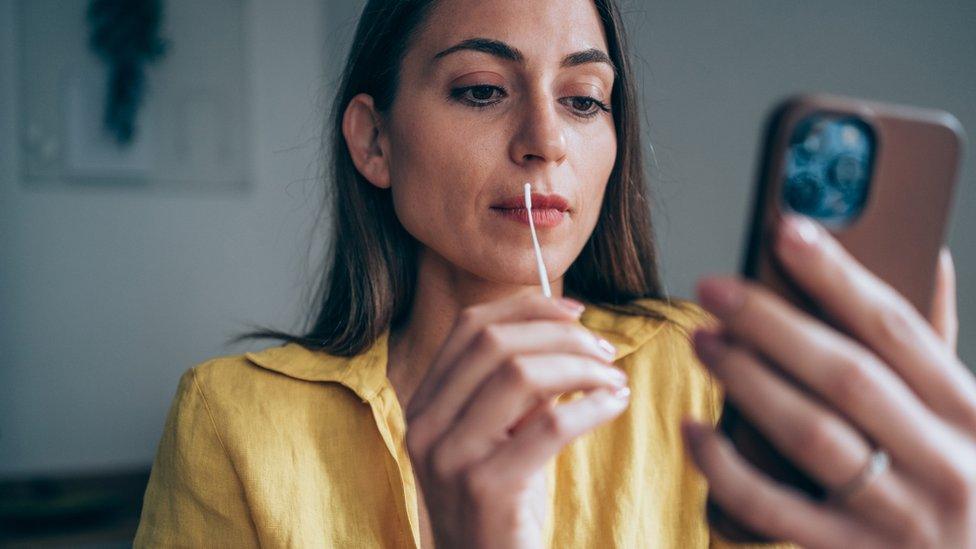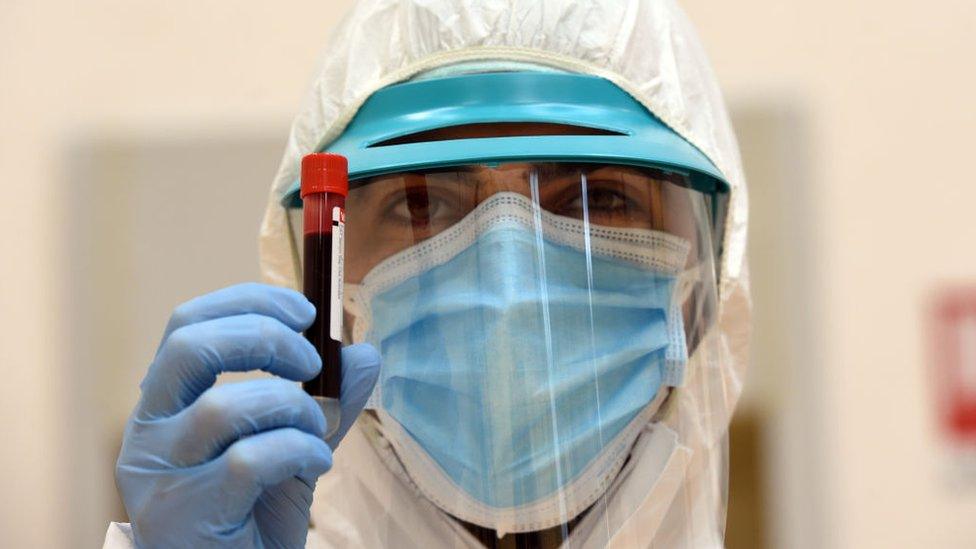Covid antibody test a 'positive development'
- Published
- comments

A test to find out whether people have been infected with coronavirus in the past has been approved by health officials in England.
Public Health England said the antibody test, developed by Swiss pharmaceutical company Roche, was a "very positive development".
The blood test looks for antibodies to see if a person has already had the virus and might now have some immunity.
Until now, officials have said such tests are not reliable enough.
The government previously spent a reported £16m buying antibody tests which later proved to be ineffective.
Sources told the BBC the Roche test was the first one to offer serious potential.
Antibodies are made by our immune system as it learns to fight an infection.
Finding antibodies that attack the coronavirus show that person has been infected in the past, but they do not prove they are protected against it in the future.
Experts at the government's Porton Down facility evaluated the Roche test last week, Public Health England said.
Roche found that if someone had been infected, it gave the correct result 100% of the time.
If someone had not caught coronavirus then it gave the correct result more than 99.8% of the time.
It means fewer than two in 1,000 healthy people would be incorrectly told they had previously caught the coronavirus.
Health minister Edward Argar said the tests would mainly be used on those in the NHS and social care settings to begin with.
He could not give an exact date for when the testing could start.
Prof John Newton, national coordinator of the UK coronavirus testing programme, said: "This is a very positive development because such a highly specific antibody test is a very reliable marker of past infection.
"This in turn may indicate some immunity to future infection, although the extent to which the presence of antibodies indicates immunity remains unclear."
Roche is understood to be in talks with the Department of Health and Social Care about possible use by the NHS in England, though other testing products are also being assessed.
Health officials in Scotland, Wales and Northern Ireland make their own decisions, but are likely to follow suit if England does adopt it.
The test already has approval from medical regulators in the EU and the United States.


The main use of an antibody test is to find out how many people have been infected.
The official figures are only a fraction of the total number - not everybody is getting tested and some people are being infected without developing symptoms.
Antibody tests will help answer questions such as how far and how easily the virus has spread and, crucially, how deadly it really is.
The second use - helping to lift lockdown - is highly controversial.
The idea is if you have antibodies, then you can go back to work. This could be particularly helpful in hospitals and care homes full of vulnerable people, if you could guarantee the staff were immune.
But having antibodies does not automatically mean you cannot get sick or harbour the virus and pass it on to others.
World Health Organization scientists advise against using so called "immunity passports" because of the lack of evidence.

The swab tests currently being carried out in the UK determine whether someone has the virus at the time of the test.
These will remain the core part of the government's test, track and trace strategy for containing the spread of the virus.
Another 428 coronavirus deaths have been recorded across the UK, bringing the total number of deaths for people who have tested positive for the virus to 33,614.
Sir John Bell, regius professor of medicine at Oxford University, described the Roche test as a "major step forward".
But although it could determine whether someone had had the infection, it did not determine "for sure" whether they would be protected from the virus in future, he said.
"We have still yet to completely understand what a positive result actually means," he told BBC Radio 4's Today programme. "So we're not there yet."


'Health certificates'
The prime minister's official spokesperson said: "We have talked about, in the future, the potential for some kind of health certificate related to whether or not you have antibodies."
But the spokesperson stressed more information was needed on immunity and coronavirus "to better understand the potential of the test".
The World Health Organization has previously warned governments not to issue so-called "immunity passports" or "risk-free certificates" as a way of easing lockdowns.
Last week, Health Secretary Matt Hancock said the UK was in talks with Roche about a "very large-scale roll-out" of coronavirus antibody testing.
But he acknowledged there had been "false hope before" and that he would only make an announcement when the government was "absolutely ready".


SCHOOLS: When will children be returning?
EXERCISE: What are the guidelines on getting out?
THE R NUMBER: What it means and why it matters
AIR TRAVELLERS: The new quarantine rules
LOOK-UP TOOL: How many cases in your area?

BBC Reality Check correspondent Chris Morris said other European countries were already carrying out limited antibody testing programmes.
In Germany, 61,299 antibody tests were conducted last week, according to the Accredited Laboratories for Medicine association (ALM).
In Spain, the health ministry said on Wednesday that preliminary results of one study, based on more than 60,000 antibody tests around the country, suggested about 5% of the population had been infected by coronavirus so far.
In other developments:
Re-starting NHS services, including cancer care and routine surgery, could take many months, experts have warned
Campaigners have expressed fears for people with learning disabilities, after an increase in deaths
Care homes felt "completely abandoned" as the coronavirus crisis spread across the UK, the National Care Association said
Scores of UK and US children have been affected by a rare inflammatory disease linked to coronavirus
EastEnders and Top Gear will resume filming, with stars doing their own hair and make-up to allow for social distancing

HOSPITAL SPECIAL: The human stories behind the headlines
JESSE LINGARD'S HOME WORKOUT: Can you keep up?

- Published18 April 2020

- Published3 May 2022

- Published4 May 2020
